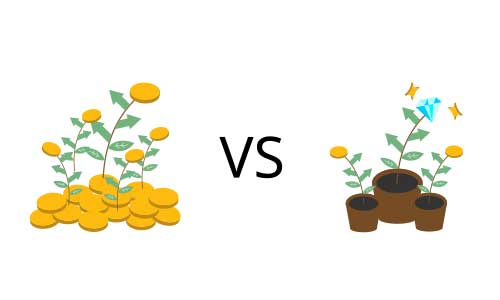Liquid Funds vs Debt Funds: Which is Better?
Equity instruments are not always necessary for investors to make money or increase their wealth. Debt instruments offer a great alternative, especially for conservative investors looking for stability and lower risk.
Among options related to mutual funds, liquid funds and debt funds are popular choices. However, to select the best investment in UAE based on your financial goals and other factors, understanding their differences is crucial.
This article provides a detailed comparison of liquid funds vs debt funds, highlighting their investment strategies, risk levels, returns, and suitability for different investors.
Best Investment Plans in UAE
Some of the best Investment quotes in UAE & Dubai are:





What are Liquid Funds?
Mutual funds that invest in short-term debt securities are known as liquid funds. These funds invest in instruments such as —
- Certificates of Deposit (CDs)
- Treasury Bills (T-Bills)
- Commercial Papers (CPs)
These funds are ideal for investors who require high liquidity and quick access to their money.
Key characteristics of liquid funds —
- Maturity period: Up to 91 days, reducing interest rate risks
- Returns: Typically higher than savings accounts but lower than other debt funds
- Liquidity: High — you can redeem your investments within 1-3 working days
- Risk: Low, though credit risk and market changes can still impact returns
- Best suited for: Parking surplus cash, emergency funds, and short-term investments
Pros and Cons of Liquid Funds
| Pros | Cons |
|---|---|
| High liquidity with quick access | Limited potential for high returns |
| Low risk due to short-term assets | Not entirely risk-free (credit risk) |
| Better returns than savings accounts | Unsuitable for long-term investments |
| No lock-in period for investments | Returns may fluctuate slightly |
| Ideal for emergency funds | Limited scope for wealth creation |
What are Debt Funds?
Debt funds invest in fixed-income instruments like —
- Bonds
- Treasury Bills
- Corporate Debt Securities
Debt mutual funds provide stable income and capital preservation, making them attractive to conservative investors.
Key characteristics of debt funds —
- Investment horizon: Ranges from short-term to long-term investments
- Returns: Depend on interest rates and market conditions
- Risk level: Lower than equity funds but higher than liquid funds
- Liquidity: Moderate — redemption takes longer and may involve exit loads
- Best suited for: Investors seeking stable returns over a medium to long-term period
Pros and Cons of Debt Funds
| Pros | Cons |
|---|---|
| Diversified options for various goals | Performance affected by interest rates |
| Tax-efficient for long-term investments* | Carries credit and default risks |
| Offers stable and predictable returns | Lower liquidity compared to liquid funds |
| Suitable for medium-to-long-term goals | Returns are market-linked, not guaranteed |
| Less risky than equity funds | Potential inflation risk |
Grow Your Wealth with Mutual Funds — Invest Smart, Invest TodayInvest Now |
|---|
Difference Between Liquid and Debt Funds
The table below will answer all your queries related to “are liquid funds debt funds?” —
| Parameter | Liquid Funds | Debt Funds |
|---|---|---|
| Primary Instruments | Treasury Bills, Commercial Papers, CDs | Bonds, Corporate Debt, Government Securities |
| Investment Horizon | Short-term (up to 3 months) | Medium-to-long-term goals |
| Risk Level | Low risk | Moderate risk |
| Liquidity | High liquidity — redemption usually within 24 hours | Moderate liquidity — longer redemption time |
| Returns | Stable but relatively lower returns | Potential for higher returns |
| Taxation | Short-term capital gains tax applicable* | Long-term investments get indexation benefits* |
| Ideal For | Emergency funds, short-term cash parking | Income generation, long-term wealth creation |
| Market Sensitivity | Less affected by market fluctuations | Sensitive to interest rate changes |
| Suitability | Best for low-risk investors needing quick access | Suitable for moderate-risk investors with long-term goals |
*While the UAE doesn’t have any personal income tax, other popular investment destinations such as India and the US have such taxes
Liquid Funds vs Debt Funds — How to Make the Right Choice?
The choice between liquid and debt funds depends on several factors —
1. Investment Objective
- Liquid funds: Best for emergency funds and short-term parking of surplus cash
- Debt funds: Suitable for stable income generation and long-term wealth accumulation
2. Time Horizon
- Liquid funds: Ideal for short-term investments (up to 3 months)
- Debt funds: Better suited for medium-to-long-term goals
3. Risk Appetite
- Liquid funds: Low-risk, suitable for conservative investors
- Debt funds: Moderate-risk — exposed to interest rate fluctuations and credit risks
4. Market Conditions
- Liquid funds: Less affected by market fluctuations and interest rate movements
- Debt funds: More sensitive to changes in interest rates and credit market conditions
Debt Mutual Funds vs Liquid Funds — Which Fund is Better?
To choose the best mutual fund in UAE for your needs, think about your investing horizon, risk tolerance, and financial objectives before making a choice.
- If you need quick access to funds, go for liquid funds
- If you are looking for stability with better returns over time, debt funds are a better choice
Frequently Asked Questions
1. What are the disadvantages of liquid funds?
Liquid funds, while offering safety and liquidity, have disadvantages like potentially lower returns compared to other debt or equity investments and exposure to credit and interest rate risks.
2. Are liquid funds 100% safe?
While liquid funds are considered low-risk compared to other mutual fund categories, they are not entirely risk-free. Although these risks are typically fewer than those of other fund types, they are subject to some risks.
3. Is a liquid fund better than an FD?
Liquid funds can offer slightly higher returns and better liquidity than Fixed Deposits (FDs), but they also come with a small amount of market risk. FDs, meanwhile, offer guaranteed returns and are considered very low-risk.
More From Investment
- Recent Articles
- Popular Articles























